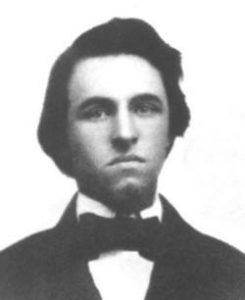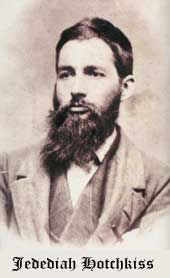When Stonewall Said “No”

At the beginning of 1863, James Keith Boswell – Chief of Engineers for the Second Corps, Army of Northern Virginia – had a dilemma. He was desperately in love, but didn’t know if his sweetheart really loved him. He absolutely had to go see her!
The problems began there. Boswell’s commander – General Thomas J. “Stonewall” Jackson – notoriously refused to grant furloughs for trifling reasons. The general didn’t seem to have much sympathy for Boswell’s love affair, even though he must have heard about it. Boswell wore his feelings for Miss Carter proverbially on his sleeve and told anyone who would listen (or couldn’t get away) about his lovelorn heart.
Jedidiah Hotchkiss – Jackson’s mapmaker and topographical engineer – also had a dilemma. He worked closely with Boswell and shared a tent with the younger man. Hotchkiss was getting tired of hearing Boswell’s romanticism, wonderings, and wished-for love story details. If only Boswell could just go see his girl and settle once and for all if she really love him, if she would wait for him, and if she would actually marry him.[i]

Hotchkiss realized there were multiple challenges to getting an answer, a conclusion, and some sort of ending to the romantic’s lamenting. First, Jackson didn’t hand out furloughs just to ease someone’s mind about familial or friendly matters. Second, Jackson didn’t seem to have much knowledge or patience for Boswell’s languishing love affair (or Hotchkiss’s listening ear). Third, Miss Carter lived in Fauquier County, Virginia, which was occupied by Union soldiers, and it wasn’t likely Jackson would let Boswell traipse into enemy territory to settle a relationship.
They tried, though. But Stonewall refused to let Boswell go.
General J.E.B. Stuart called occasionally at Jackson’s headquarters at Moss Neck Plantation, arriving with jokes and good humor. Aware of his joyous attitude and romantic idealism, Hotchkiss quietly talked to Stuart when Jackson wasn’t around. Could Stuart ask Jackson to “lend” Boswell to the cavalry for a few weeks to do some scouting and surveying? Apprised of the whole situation, Stuart entered into Hotchkiss’s scheme and with an innocent appearance got Jackson to send Boswell to Stuart’s staff and headquarters – temporarily.[ii]
Once Boswell was out of Jackson’s sight and under Stuart’s command, Stuart sent him packing with full permission to head north (doing a little scouting along the way) and spend a nice long visit at the Carter home, do a little courting, and hopefully return a happier man. Boswell headed north while the two schemers – Stuart and Hotchkiss – hoped for his success and perhaps shared a chuckle at Stonewall’s expense.
North in Fauqueir County, Boswell hung around Miss Sophia DeButts Carter’s family home – Glen Welby – for days, mooning over Miss Carter and yet too worried to ask her to marry him. What if she refused? Could he live without her? An extreme romantic, Boswell supposed the worst and seemed unwilling to endure the possibility that his true love, happy illusion, extreme crush, extensive obsession, or whatever-you-want-to-call-it affair might end without happily-ever-after. He noticed with increasing worry that Miss Sophia Carter had other suitors calling regularly at her home and knew he had to have an answer – one way or another – before his sneaky furlough ended.

Finally, January 21, 1863. To Boswell, it seemed the perfect day and opportunity for a proposal. Miss Carter had purposely sung his favorite, requested song and Boswell, hovering around the piano, felt “happy…I was intensely happy.”[iii] Clearly, Boswell’s rival at Glen Welby wasn’t pleased that evening, and the situation took a frightful turn when, after evening prayers, Boswell and Miss Carter sat close together. The other suitor stalked out of the room, leaving Boswell to chat with his lady and perhaps finally ask her the all-important question. Suddenly, a loud noise startled the family and guests. The young men rushed upstairs, only to find that the disappointed suitor – Boswell’s rival – had shot himself and lay dead on the floor.
Boswell later wrote that he simply wanted to leave. “Oh, at that moment I would have given worlds to have been anywhere rather than at this house.”[iv] Still, he stayed, reluctantly, and convinced now was definitely not the right time to ask Miss Sophia Carter to marry him. Then, welcome news arrived: Jackson needed Boswell to come “home” to military headquarters. Miss Carter heard the news and carefully avoided any private meeting with Boswell, making him more nervous that she would not accept his offer.
On his final morning at Glen Welby, Boswell insisted by a polite note that Miss Carter should meet him in the house’s dining room. He later wrote, “She came down looking so beautiful, yet so sad.”[v] Patiently, Boswell talked about other subjects for a while, then determined to hear his happy future or doom. He asked, “Can you ever learn to love me?” Miss Carter seemed very uncomfortable, he noted, as she replied, “It can never be.”[vi]
Boswell headed south with crushed hopes and a broken heart. He wrote all his woes in his journal. And at the end of the journey back to camp, Jed Hotchkiss would be waiting to hear all about the situation, and poor Hotchkiss would seriously fear for young Boswell’s sanity after Miss Carter’s rejection.
While Boswell was away from Second Corps Headquarters, Jackson – presumably oblivious to the trick Stuart and Hotchkiss had played on him – needed some engineering reports. Since borrowing engineers seemed to the now-fashionable thing to do, Stonewall sent a request for Stuart to lend his staff engineer to accomplish the task. Stuart – a little irritated, but not willing to let Jackson know why Boswell had been borrowed – grumbled to Hotchkiss and vowed not to meddle with Jackson’s officers again.
The moral of the story? I leave it for you to decide if this is merely true historic entertainment or an example of some great principle of leadership, life, or love.
Sources:
[i] Miller, William J. Mapping for Stonewall: The Civil War Service of Jed Hotchkiss. Elliott & Clark Publishers. 1993. Page 102.
[ii] Ibid, 102.
[iii] Ibid, 103.
[iv] Ibid, 104.
[v] Ibid, 104.
[vi] Ibid, 104.
Sarah
Very interesting, I read through the whole blog entry to read the conclusion. The blog entries arrive pretty fast at times, but as I read it the blog became a “page turner” for me. This was a “People’s War.” Most people involved in this war were pulled from their classrooms, cornfields, factory jobs, and wives. The participants were often very local and raw with their feelings. Ms. Carter enjoyed “toying” with the local men who “called” on her. By 1865 those raw feelings of home and family torn the Confederates away from their ranks as much as General Grant’s artillery. This was a fun read.
Glad you liked it, Robert. It’s an account that always makes me chuckle and it was a delight to share. More serious work on J.K. Boswell coming soon…
Thanks for the humanity. I do love your writing, maybe most, for this reason. I really regret missing your day about Dr. McGuire.
Thanks, Joe. Maybe there’ll be another McGuire presentation at another time or at least a blog post or two in the future.
I like Hotchkiss’s attitude and approach in this. Anything to shut this guy up! Man, I can sympathize…LOL..